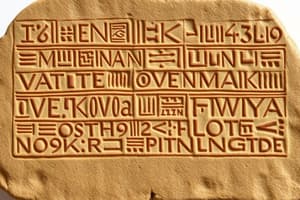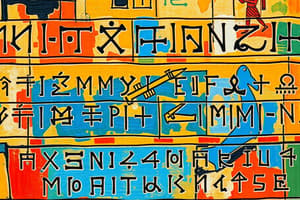Podcast
Questions and Answers
During which historical period did cuneiform gradually evolve into a logographic system?
During which historical period did cuneiform gradually evolve into a logographic system?
- Proto-Cuneiform period
- Middle Babylonian period (correct)
- Old Babylonian period
- Neo-Assyrian period
What was the purpose of the 19-sign syllabary introduced by the Akkadians during the Old Babylonian period?
What was the purpose of the 19-sign syllabary introduced by the Akkadians during the Old Babylonian period?
- Making cuneiform more complex
- Each sign represented a syllable (correct)
- Reducing the number of characters required
- Representing entire words
How did the incorporation of additional signs by the Akkadians impact the evolution of cuneiform?
How did the incorporation of additional signs by the Akkadians impact the evolution of cuneiform?
- Retained the simplicity of proto-cuneiform
- Simplified the writing system (correct)
- Reduced the number of characters
- Made it more logographic
What writing system was used in combination with cuneiform during the Neo-Assyrian period?
What writing system was used in combination with cuneiform during the Neo-Assyrian period?
What did the rise of the Akkadians contribute to the evolution of cuneiform?
What did the rise of the Akkadians contribute to the evolution of cuneiform?
Study Notes
Cuneiform: Unraveling an Ancient Writing System
Cuneiform, originating over 5,000 years ago in the flourishing civilizations of ancient Mesopotamia, is one of the earliest known writing systems in the world. This article delves into the triangular marks that form the basis of this intriguing script, exploring its history and evolution.
Triangular Marks
The building blocks of cuneiform are wedge-shaped marks, or cunei (singular: cuneus), which were made by pressing a stylus into soft clay tablets. The stylus was typically made from reed or bone, and it was held at various angles to create the triangular shapes. The orientation of the cunei, their position on the tablet, and the direction the stylus was used to make them (toward the left or right) all conveyed meaning in this symbol-based writing system.
History
Cuneiform first emerged between 3100 and 3000 BCE in southern Mesopotamia, the geographic area that encompassed present-day Iraq and Iran. It is considered to be the oldest non-pictographic writing system, with its roots deeply entrenched within the Sumerians, the earliest known civilization in the region. Once the Sumerians passed cuneiform to their Akkadian successors, the writing system expanded, finding its way to the Hittites, the Assyrians, and the Babylonians. Cuneiform was used to record and preserve a wide variety of texts, from administrative documents and religious texts to literary works and even scientific treatises.
Evolution
Cuneiform evolved over several millennia, undergoing a number of changes that reflect the changing needs of the civilizations that used it. One of the earliest forms of cuneiform is known as proto-cuneiform, which consisted of simple wedge-shaped signs. With the rise of the Akkadians, cuneiform became more complex, incorporating additional signs, many of which were derived from the proto-cuneiform system.
The Akkadians also introduced a new system of writing known as the Old Babylonian period, which involved a 19-sign syllabary, where each cuneiform sign represented a syllable. This change made cuneiform much easier to learn and use, and it helped to expand the writing system's popularity.
A major evolutionary change in cuneiform occurred during the Middle Babylonian period, when the writing system gradually evolved into a logographic system. This meant that individual cuneiform signs began to represent entire words or concepts, greatly reducing the number of characters required to write a given text.
Cuneiform's evolution continued through the Neo-Assyrian period, when it was used in combination with other writing systems, such as the Aramaic alphabet. Ultimately, cuneiform's usage declined as other writing systems, such as the Greek and Aramaic alphabets, gained popularity.
The invention of cuneiform opened new doors for the civilizations of ancient Mesopotamia, paving the way for the development of literature, science, and governance. Its evolution reflects the changing needs and aspirations of the societies that used it, providing a unique window into the past that continues to fascinate scholars today.
Studying That Suits You
Use AI to generate personalized quizzes and flashcards to suit your learning preferences.
Description
Explore the history and evolution of cuneiform, one of the earliest known writing systems originating in ancient Mesopotamia over 5,000 years ago. Learn about the triangular marks, their symbolic meanings, and the civilizations that used this script for administrative, religious, and literary purposes.




